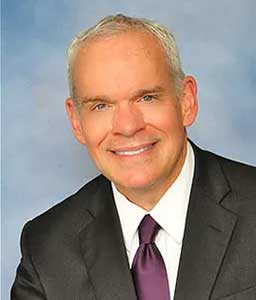PHOENIX — Claims adjusters may groan at any mention of “going to appraisal.” But insurance defense attorney Andrew P. Rock sees the process as an opportunity. He says appraisals are another form of alternative dispute resolution.
“If I look at a case and if it looks like there’s something that can be appraised, I go to appraisal,” Rock said during a presentation Thursday at the Property & Liability Resource Bureau’s Large Loss Conference.

Rock, with the Rock Law Group in Maitland, Florida, and attorney Nathan Thompson with Citizens Property Insurance in Jacksonville, offered guidance on how to properly manage the appraisal process when contending with inflated damage estimates presented by self-interested public adjusters and overzealous plaintiff’s attorneys.
Thompson said insurers have good reasons to avoid litigation. One of the lawsuits he is defending for Citizens was filed in 2009. Florida statutes require insurers to pay the policyholder’s attorney fees when they lose. Those fees can reach outrageous totals for long-litigated cases, he said.
Juries often are not kind to insurance companies, Thompson said. Juries in the Florida Keys, especially, are notorious for “protecting their own.”
“Literally, we’ve never won a case in the Florida Keys,” he said.
Once the appraisal process starts, Rock said claims managers need to pay attention every step of the way. While insurance policies usually call for an appraisal to resolve disputes about value, they don’t provide any details about how the appraisal should be conducted or how long it should take.
Rock said if possible, ask the policyholder’s attorney to agree to a memorandum of appraisal to settle on some ground rules. Which structures should be appraised? What coverages apply? How long will the process take?
Some adjusters may approach the process like this: “Hey, you’re my appraiser. Wake me up when it’s over,” Rock said, then shook his head side to side. “No. That’s not going to have a good outcome is it?”
Rock said if the plaintiff refuses to agree to parameters, the adjuster can still make sure the insurer’s appraiser knows what is expected. Insist on line-item details for estimates, he said. Insist on photographs with captions explaining any coverage issues, such as mold or dry rot that may be excluded from coverage. Stay in touch to make sure the process doesn’t go off track.
The plaintiff’s attorney may raise new issues while the appraisal is underway. Don’t get sidetracked, Rock said. Insist that any new alleged damage be backed up with a proof of loss and adjust the new demand as if it were a brand new claim. Careful documentation may impress the umpire who ultimately may have final say.
“This idea is to put the information in front of the umpire just like you did when you adjusted the claim.”
Of course, appraisals cannot be used to determine whether coverage exists. Often, insurance adjusters encounter deferred maintenance issues and construction defects when inspecting a damaged property. These may present challenging ethical issues.
Professional engineer Jeffrey Frazler and independent adjuster Cassandra Hand Gallegos outlined the ethical responsibilities of engineers and claims adjusters during a separate presentation during the PLRB conference.
Frazler, with Sdii Global Corp. in Tampa, displayed photographs of various dangerous situations he had encountered when out inspecting properties. One depicted the roof of a church that has become separated from the truss and was in danger of imminent collapse because of slipshod construction.
“You hear that old saying that they don’t build them like they used to,” he said. “Sometimes that’s a good thing.”
Frazler said insurers that hire him often expect confidentiality, but his first responsibility is to protect the public’s health, safety and welfare. If he doesn’t report dangerous conditions he risks losing his professional engineer’s license.
The church with the sagging roof housed a daycare center. Frazler said he had to inform the pastor that the center needed to close down until repairs were made. He said he also reported the condition of the roof to the insurer who hired him and municipal building officials.
“I can’t let kids get hurt,” Frazler said.
Gallegos, who is chief executive officer of CCMS & Associates in Dunedin, Florida, said insurance adjusters also have ethical duties, which are sometimes spelled out in detail (such as in her home state of Florida) — and sometimes not (such as in North Carolina, which advises adjusters to “be good”) — by state statutes. Often, she said, any duty to report will create a conflict with the adjuster’s perceived duty to the insurer, which may not be interested in dealing with an even larger potential claim.
“How many times do we ask our engineers not to put that in the report?” she asked the audience. “Lots of times, right?”
About the photo: Attorney Andrew Rock displayed this photo as he told the imaginary story of a claim filed by the owners of a house named Versailles on Fear Some Bay, Florida during his presentation at the PLRB conference in Phoenix on Thursday.
Was this article valuable?
Here are more articles you may enjoy.


 LA County Told to Pause $4B in Abuse Payouts as DA Probes Fraud Claims
LA County Told to Pause $4B in Abuse Payouts as DA Probes Fraud Claims  Why 2026 Is The Tipping Point for The Evolving Role of AI in Law and Claims
Why 2026 Is The Tipping Point for The Evolving Role of AI in Law and Claims  These Five Technologies Increase The Risk of Cyber Claims
These Five Technologies Increase The Risk of Cyber Claims  One out of 10 Cars Sold in Europe Is Now Made by a Chinese Brand
One out of 10 Cars Sold in Europe Is Now Made by a Chinese Brand 